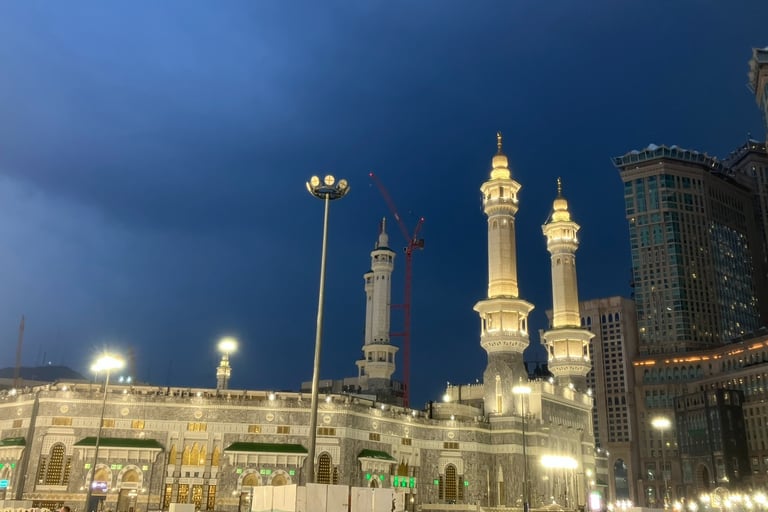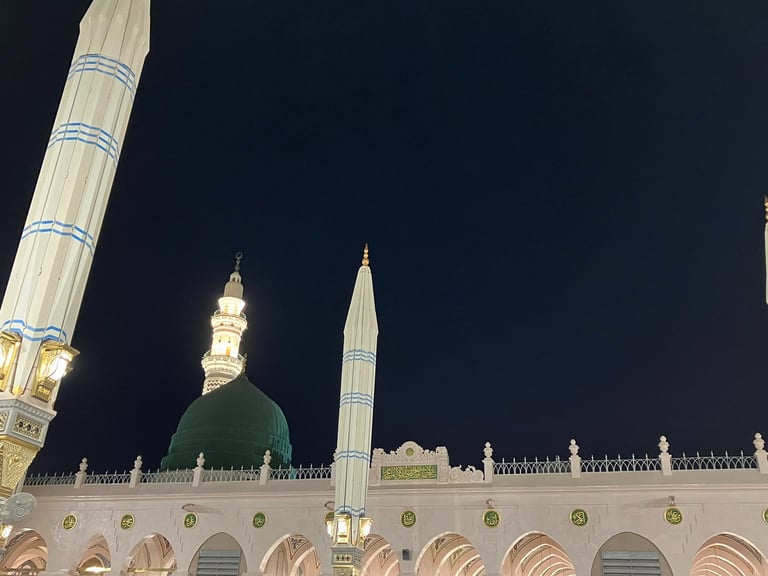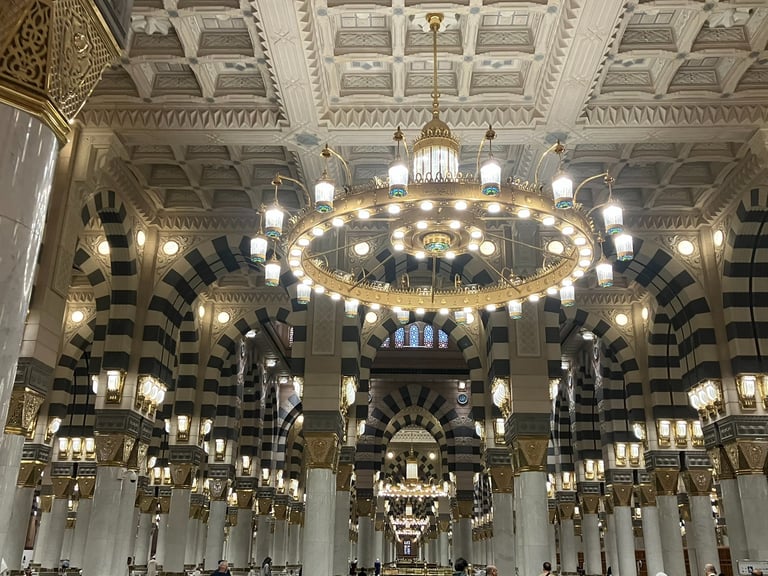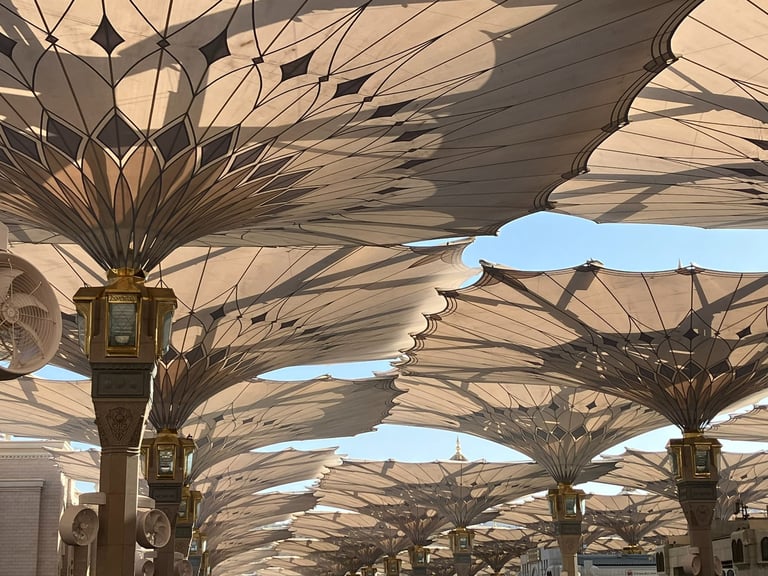History of Islam: Saudi Arabia
The Birthplace of Islam
4/5/20258 min read


بِسْمِ ٱللَّٰهِ ٱلرَّحْمَٰنِ ٱلرَّحِيمِ
Muslims all over the world are well read on the detailed history of Islam in the Holy Lands, and there is so much detail in our history books that I will never be able to do justice to it, so I will keep it short and stick to the significant milestones in the history of Islam in Saudi Arabia:
The story of Islam is deeply rooted in the land now known as Saudi Arabia. This blessed region witnessed the birth of Islam, the mission of our beloved Prophet Muhammad (peace be upon him), and the rise of a spiritual civilization that transformed the world. For Muslim families seeking to reconnect with their faith and heritage, understanding the history of Islam in Saudi Arabia offers more than just historical context, its a connection to all of us.
1. Pre-Islamic Arabia: A Land Awaiting Revelation
Before the arrival of Islam, the Arabian Peninsula was a tapestry of tribal societies. While the Kaaba in Makkah had been built by Prophet Ibrahim (peace be upon him) and his son Prophet Ismail (peace be upon him), over time it had become surrounded by idolatry. Hundreds of idols stood around the sacred structure, and the pure monotheism that once characterized the region had been overshadowed by ignorance.
Makkah, however, was still a spiritual and economic hub. The Quraysh tribe, custodians of the Kaaba, held political and religious authority. Among them was the household of ‘Abdullah and Amina, parents of our beloved Prophet Muhammad (peace be upon him).
2. The Birth of the Final Messenger (peace be upon him)
In the year 570 CE, a momentous event took place—the birth of our beloved Prophet Muhammad (peace be upon him) in Makkah. Known as the "Year of the Elephant," it marked a failed attempt by Abraha, a Christian ruler from Yemen, to destroy the Kaaba, an act that Allah Himself prevented (Qur'an, Surah Al-Fil).
Raised as an orphan and known for his honesty and trustworthiness, our Prophet (peace be upon him) lived a life of reflection and sincerity. At the age of 40, while meditating in the cave of Hira, he received the first revelation from Angel Jibreel. This moment marked the beginning of Islam’s message to humanity.
3. The Makkah Period: Perseverance in the Face of Persecution
The early years of the Prophet’s (peace be upon him) mission were filled with trials. He called his people to the worship of one God—Allah SWT—and to abandon idolatry, injustice, and immorality. While a small group accepted Islam, including Khadijah (Allah be pleased with her), Abu Bakr (Allah be pleased with him), Ali ibn Abi Talib (Allah be pleased with him), and others, the opposition from the Quraysh intensified.
For 13 years in Makkah, Muslims faced torture, boycotts, and exile. Yet, their patience and reliance on Allah SWT served as an example for all believers to come.
One of the most significant events during this period was the Isra and Mi'raj—the miraculous night journey and ascension of our beloved Prophet (peace be upon him). It reaffirmed his divine mission and established the importance of Salah (prayer) for all Muslims.
4. The Hijrah: Migration to Madinah
In 622 CE, under divine command, the Prophet (peace be upon him) and his companions (Allah be pleased with them) migrated to Yathrib, later known as Al-Madinah Al-Munawwarah (The Enlightened City). This migration, or Hijrah, marked a turning point in Islamic history and the beginning of the Islamic calendar.
The people of Madinah, known as the Ansar (Allah be pleased with them), welcomed the Muhajirun (the emigrants from Makkah) with open arms. The Prophet (peace be upon him) established a brotherhood between them, creating a unified community (Ummah) built upon justice, equality, and faith.
5. The Madinah Period: Establishing the Islamic State
In Madinah, our beloved Prophet (peace be upon him) not only acted as a spiritual leader but also as a statesman, judge, and military commander. He established the first constitution in Islamic history—the Constitution of Madinah—ensuring religious freedom, justice, and mutual responsibility among the diverse tribes and communities.
Several key battles occurred during this time:
Battle of Badr (624 CE):
The Battle of Badr stands as one of the most significant and miraculous events in Islamic history. Fought near a well called Badr, southwest of Madinah, it was the first major military confrontation between the Muslims and the Quraysh of Makkah. The Muslims, numbering only about 313 men—many of whom were poorly equipped—faced a Qurayshi army of over 1,000 well-armed soldiers. Despite being vastly outnumbered, the believers were granted victory by the help of Allah, as described in Surah Al-Anfal. This battle marked a turning point, affirming the truth of Islam and strengthening the Muslim community in Madinah. For Muslim families, Badr is a powerful lesson in trust in Allah, unity, and the rewards of standing firm in the face of oppression.
Battle of Uhud (625 CE):
One year after Badr, the Quraysh sought revenge and marched with a force of 3,000 men to attack Madinah. The Muslims, around 700 in number, went out to defend the city near Mount Uhud. Initially, the Muslims were close to victory. However, a critical mistake changed the outcome: a group of archers disobeyed the Prophet’s (peace be upon him) instructions and left their post, thinking the battle was won. This allowed the Qurayshi cavalry to launch a counterattack, resulting in a painful setback for the Muslims and the martyrdom of many, including the Prophet’s (peace be upon him) beloved uncle Hamza (Allah be pleased with him). The Battle of Uhud teaches Muslim families about the importance of discipline, obedience to leadership, and patience through trials. It also serves as a reminder that even setbacks hold wisdom and growth for the believers.
Battle of the Trench (627 CE):
The Battle of the Trench was a unique confrontation that highlighted the strategic foresight of our beloved Prophet Muhammad (peace be upon him) and the importance of consultation and community effort. When a coalition of Quraysh and other tribes formed a massive army to besiege Madinah, the Muslims—under the advice of Salman al-Farsi (Allah be pleased with him)—dug a trench around the city, an unfamiliar tactic in Arabian warfare. The siege lasted for nearly a month during the harsh winter. Despite the enemy’s size and intent, they could not breach the trench, and Allah sent a powerful windstorm that forced them to retreat. The Muslims emerged victorious without engaging in direct battle. For Muslim families, this event underscores the power of collective effort, reliance on Allah, and the value of strategic thinking grounded in faith.
6. The Conquest of Makkah: Victory with Humility
In 630 CE, the Muslims returned to Makkah—not with vengeance, but with mercy. The conquest was peaceful, and our beloved Prophet (peace be upon him) forgave the very people who had persecuted him. The idols were removed from the Kaaba, and the sanctuary was restored to its original purpose: a house of monotheism and submission to Allah.
This monumental event was not just a military victory—it was the spiritual reawakening of Arabia.
7. The Farewell Pilgrimage and Final Sermon
In 632 CE, our Prophet (peace be upon him) performed his only Hajj and delivered the Farewell Sermon on the plain of Arafat. His words remain a timeless charter for humanity:
He emphasized justice, the rights of women, the sanctity of life, and the importance of the Qur'an and Sunnah. Soon after, our beloved Prophet (peace be upon him) returned to his Lord, leaving behind a complete religion and a deeply transformed Arabia.
8. The Caliphate Era and Expansion of Islam
Following the death of the Prophet (peace be upon him), leadership passed to Abu Bakr as-Siddiq (Allah be pleased with him), the first Caliph. This marked the beginning of the Rashidun Caliphate, a golden age where Islam spread beyond Arabia under the leadership of pious companions (Allah be pleased with them), including:
Umar ibn Al-Khattab (Allah be pleased with him): Under his rule, Islam reached Egypt, Persia, and Al-Aqsa
Uthman ibn Affan (Allah be pleased with him): Oversaw the compilation of the standardized Qur’an
Ali ibn Abi Talib (Allah be pleased with him): Known for his wisdom and justice.
Despite political challenges, this period saw the preservation and expansion of Islamic knowledge and governance.
9. The Umayyad and Abbasid Influence in Arabia
While the capital of the Muslim empire moved to Damascus (Umayyad) and later Baghdad (Abbasid), the cities of Makkah and Madinah remained the spiritual heart of Islam.
Pilgrimage to the Kaaba (Hajj and Umrah) continued to bring Muslims from across the world, reinforcing the central role of Saudi Arabia in Islamic identity. Madinah remained a center of scholarship and spiritual devotion.
10. The Ottoman Era and Custodianship of the Haramain
In 1517, the Ottomans assumed custodianship of the Haramain (Makkah and Madinah). They invested heavily in maintaining the holy sites, building infrastructure such as water systems, roads, and security for pilgrims.
Although politically distant, the Ottoman rulers regarded the cities with immense reverence, ensuring that Islamic traditions were preserved.
11. The Rise of Modern Saudi Arabia
In the 18th century, a religious and political movement emerged in the central Arabian region of Najd. Led by Sheikh Muhammad ibn Abdul Wahhab and supported by the Al Saud family.
In 1932, the modern Kingdom of Saudi Arabia was founded under King Abdulaziz Al Saud. With the discovery of oil and modernization efforts, the kingdom grew economically and politically, but it maintained its identity as the guardian of the two holy mosques.
12. Saudi Arabia Today: Guardian of the Sacred Sites
Today, Saudi Arabia holds a unique position in the Muslim world. As the custodian of Makkah and Madinah, it hosts millions of pilgrims annually. The government has invested in expanding the Grand Mosque and the Prophet’s Mosque to accommodate the growing number of visitors.
For Muslim families, visiting Saudi Arabia is not just tourism—it is a spiritual homecoming and duty for those who can. From performing Hajj and Umrah to visiting historical sites like Mount Uhud, the Cave of Hira, and the Rawdah in Madinah, the journey offers transformative experiences that nurture the soul and reinforce Islamic values across generations.
13. Preserving the Legacy: Why It Matters for Muslim Families
Understanding the history of Islam in Saudi Arabia helps Muslim families appreciate the sacrifices of our beloved Prophet (peace be upon him) and his companions (Allah be pleased with them). It instills gratitude, strengthens Iman (faith), and fosters a sense of global Islamic unity.
The history of Islam in Saudi Arabia is not just a chronicle of events—it is a sacred story that continues to inspire millions. From the struggles in Makkah to the triumph in Madinah, from the legacy of the Caliphs to the stewardship of the Haramain, it is a reminder that Allah’s guidance is timeless and His promise is true.
As Muslim families, let us cherish this legacy, share it with our children, and keep our connection to these holy lands alive through prayer, study, and journeys.
Learn more about Saudi Arabia here
Please see our list of blogs to learn more, and you can contact us directly at muslimfamilynomad@gmail.com for any questions and even set up a consultation.
Nomad Links
Flights: Google Flights
Stays: Trip.com
VPN Routers: GL.iNet GL-MT6000 - GL.iNet GL-AXT1800 - Tenda AX3000 WiFi Router
VPN Services: SurfShark, NordVPN
Temu: Temu App Download
Esim: AloSIM
Airport Transfers: Trip.com
Car Rental: Qeeq.com
Full Product Recommendation Page
** Disclaimer: We are compensated for some of the links provided in this article if you purchase something, but we only recommend what we have used and found successful or we have done some research to find. This blog should not be used as financial advice and we are not travel agents, we are just letting you know our opinions from real life experience. May Allah bless you and your family on your travels!








Muslim Family Nomad
Discover tips for Muslim-friendly travel experiences.
Stay in Contact
© 2025. All rights reserved.
